Front Brake Caliper Replacement Single Piston
Removal Procedure
- Inspect the fluid level in the brake master cylinder reservoir.
- If the brake fluid level is midway between the maximum-full point and the minimum allowable level, no brake fluid needs to be removed from the reservoir before proceeding.
- If the brake fluid level is higher than midway between the maximum-full point and the minimum allowable level, remove brake fluid to the midway point before proceeding.
- Raise and suitably support the vehicle. Refer to Lifting and Jacking the Vehicle in General Information.
- Remove the tire and wheel assembly. Refer to Tire and Wheel Removal and Installation in Tires and Wheels.
- Compress the front caliper piston.
- Remove the brake hose-to-caliper bolt from the caliper.
- Remove and discard the 2 copper brake hose gaskets. These gaskets may be stuck to the brake caliper and/or the brake hose end.
- Remove the caliper mounting bolts.
- Remove the caliper.
- Remove the brake linings from the caliper. Refer to Front Disc Brake Pads Replacement .
- Remove the caliper mounting bolt sleeves.
- Remove the rubber O-rings and discard.
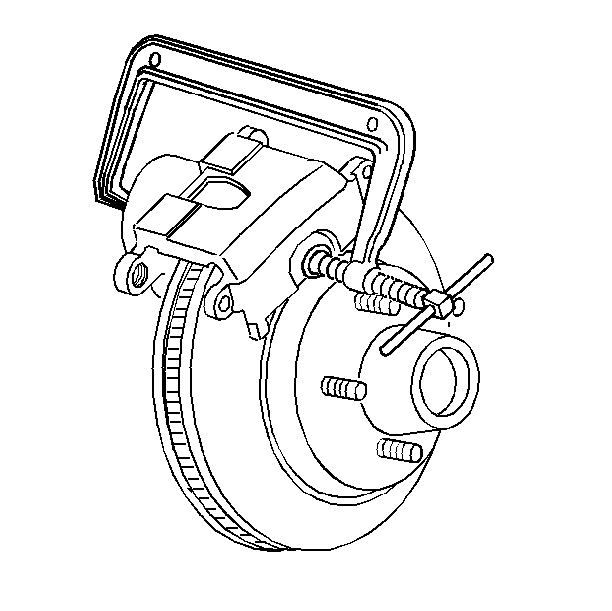
| 6.1. | Install a large C-clamp over the top of the caliper housing and against the back of the outboard pad. |
| 6.2. | Slowly tighten the C-clamp until the piston pushes into the caliper bore enough to slide the caliper off the rotor |
| 6.3. | Remove the C-clamp from the caliper. |
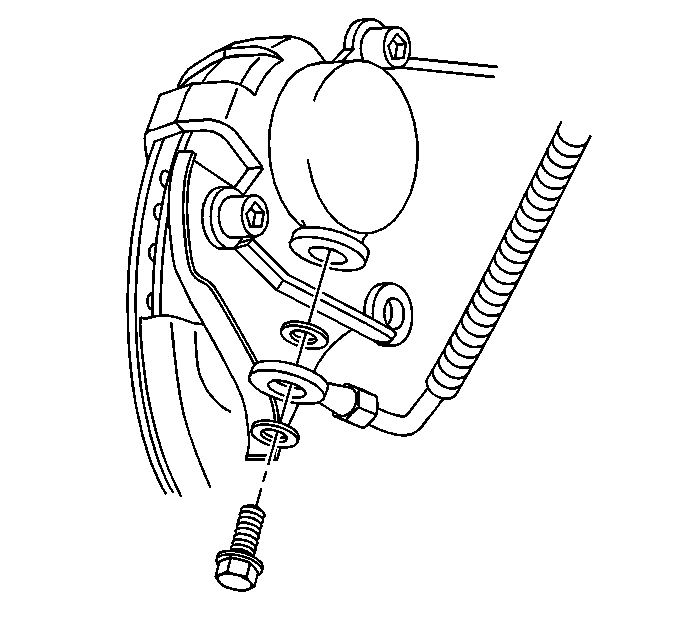
Important: Install a rubber cap or plug to the exposed brake pipe fitting end in order to prevent brake fluid loss and contamination.
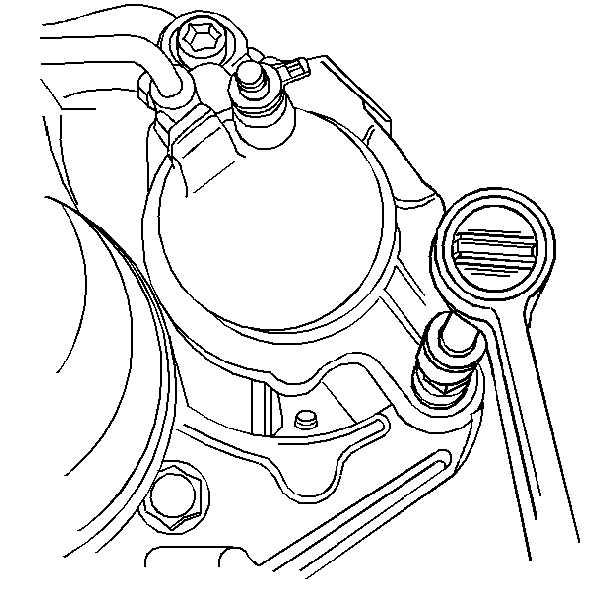
Installation Procedure
- If reusing the brake caliper pin bolts and retainers, clean the brake caliper pin bolts and retainers using denatured alcohol or equivalent.
- Dry the brake caliper pin bolts using non-lubricated, filtered air.
- Apply high temperature silicone brake lubricant to the brake caliper pin bolts and retainers. DO NOT apply lubricant to the brake pad hardware.
- Install the brake linings to the caliper. Refer to Front Disc Brake Pads Replacement .
- Install the caliper and the mounting bolts.
- Compress the lining ears to the caliper.
- Install the front brake hose fitting, the 2 new gaskets and the brake hose fitting bolt.
- Measure the clearance between the caliper and the steering knuckle.
- Install the tire and wheel assembly. Refer to Tire and Wheel Removal and Installation in Tires and Wheels.
- Lower the vehicle.
- Fill the master cylinder to the proper level with clean brake fluid. Refer to Master Cylinder Reservoir Filling in Hydraulic Brakes.
- Bleed the hydraulic brake system. Refer to Hydraulic Brake System Bleeding in Hydraulic Brakes.
- Inspect the hydraulic brake system for brake fluid leaks.
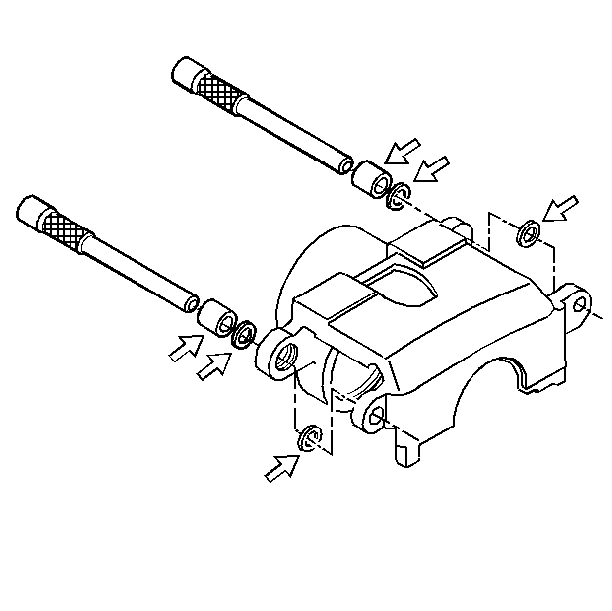
Important: Lift the inner edge caliper boot next to the piston. Press out any trapped air. The boot must lay flat below the level of the piston face.
Notice: Use the correct fastener in the correct location. Replacement fasteners must be the correct part number for that application. Fasteners requiring replacement or fasteners requiring the use of thread locking compound or sealant are identified in the service procedure. Do not use paints, lubricants, or corrosion inhibitors on fasteners or fastener joint surfaces unless specified. These coatings affect fastener torque and joint clamping force and may damage the fastener. Use the correct tightening sequence and specifications when installing fasteners in order to avoid damage to parts and systems.

Tighten
Tighten the caliper mounting bolts to 51 N·m (38 lb ft).
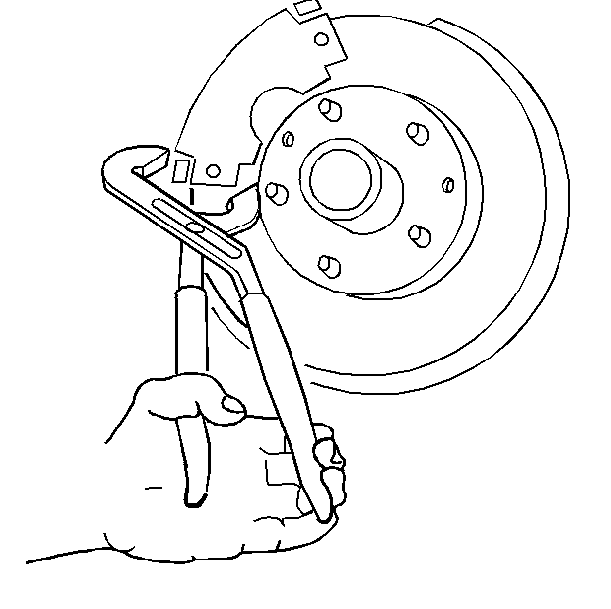

Notice: Make sure the brake hose is not twisted or kinked after installation. Damage to the hose could result.
Important: Install NEW copper brake hose gaskets.
Tighten
Tighten the front brake hose bolt to 54 N·m (40 lb ft).
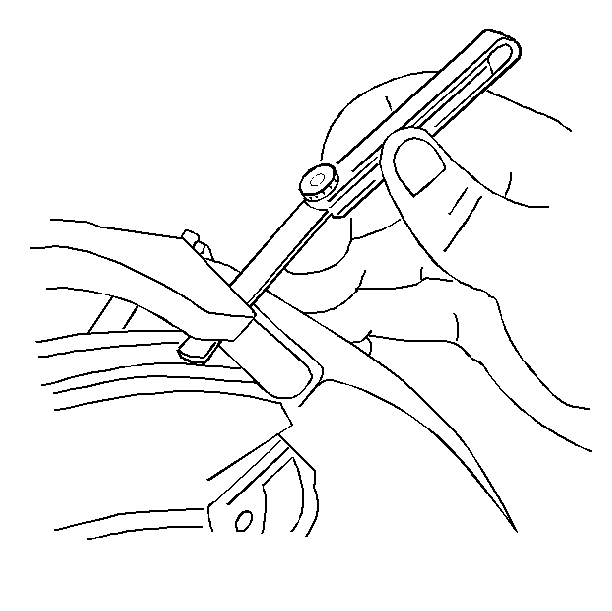
Important: If necessary, remove the front brake caliper and file the ends of the steering knuckle to obtain the proper clearance. If the total clearance exceeds the specified range, check the steering knuckle and front brake caliper for damage and replace as necessary.
| 8.1. | Measure each end of the caliper individually. |
| 8.2. | Add the two measurements together. The total measurement should be 0.26-0.60 mm (0.010-0.024 in). |
Front Brake Caliper Replacement Dual Piston
Removal Procedure
- Inspect the fluid level in the brake master cylinder reservoir.
- If the brake fluid level is midway between the maximum-full point and the minimum allowable level, no brake fluid needs to be removed from the reservoir before proceeding.
- If the brake fluid level is higher than midway between the maximum-full point and the minimum allowable level, remove brake fluid to the midway point before proceeding.
- Raise and suitably support the vehicle. Refer to Lifting and Jacking the Vehicle in General Information.
- Remove the tire and wheel assembly. Refer to Tire and Wheel Removal and Installation in Tires and Wheels.
- Install and hand tighten a wheel lug nut in order to retain the rotor (4WD only).
- Compress the front caliper piston.
- Disconnect the brake hose from the caliper.
- Remove and discard the 2 copper brake hose gaskets. These gaskets may be stuck to the brake caliper and/or the brake hose end.
- Remove the caliper guide pin bolts.
- Remove the caliper from the caliper bracket.

| 7.1. | Install a large C-clamp over the top of the caliper housing and against the back of the outboard pad. |
| 7.2. | Slowly tighten the C-clamp until the piston pushes into the caliper bore enough to slide the caliper off the rotor |
| 7.3. | Remove the C-clamp from the caliper. |
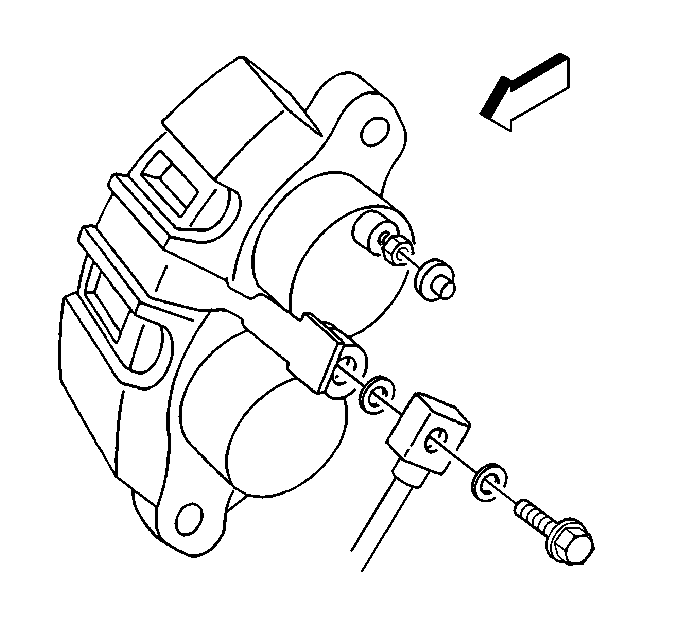
Important: Install a rubber cap or plug to the exposed brake pipe fitting end in order to prevent brake fluid loss and contamination.
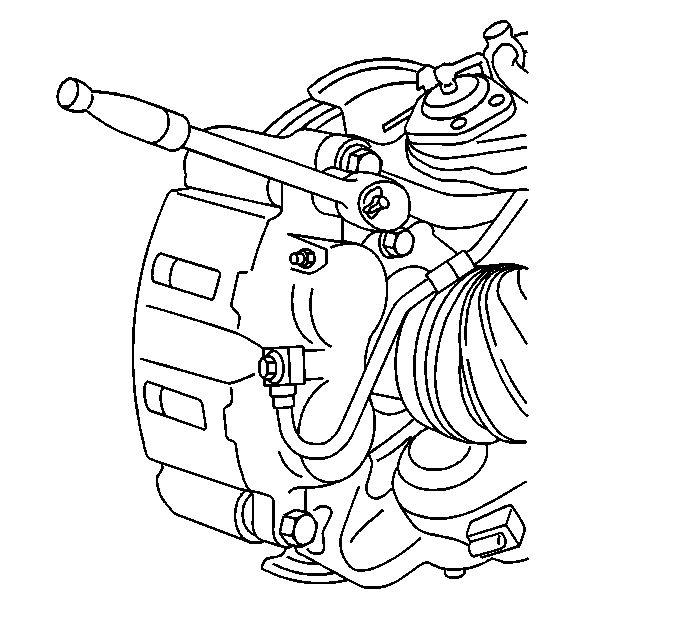
Installation Procedure
- If reusing the brake caliper pin bolts and retainers, clean the brake caliper pin bolts and retainers using denatured alcohol or equivalent.
- Dry the brake caliper pin bolts using non-lubricated, filtered air.
- Apply high temperature silicone brake lubricant to the brake caliper pin bolts and retainers. DO NOT apply lubricant to the brake pad hardware.
- Verify that the brake pads are in place.
- Install the caliper over the rotor and into the anchor bracket.
- Install the two caliper guide pin bolts to the caliper bracket.
- Install the front brake hose fitting, the 2 new gaskets and the brake hose fitting bolt.
- Install the tire and wheel assembly. Refer to Tire and Wheel Removal and Installation in Tires and Wheels.
- Lower the vehicle.
- Fill the master cylinder to the proper level with clean brake fluid. Refer to Master Cylinder Reservoir Filling in Hydraulic Brakes.
- Bleed the hydraulic brake system. Refer to Hydraulic Brake System Bleeding in Hydraulic Brakes.
- Inspect the hydraulic brake system for brake fluid leaks.
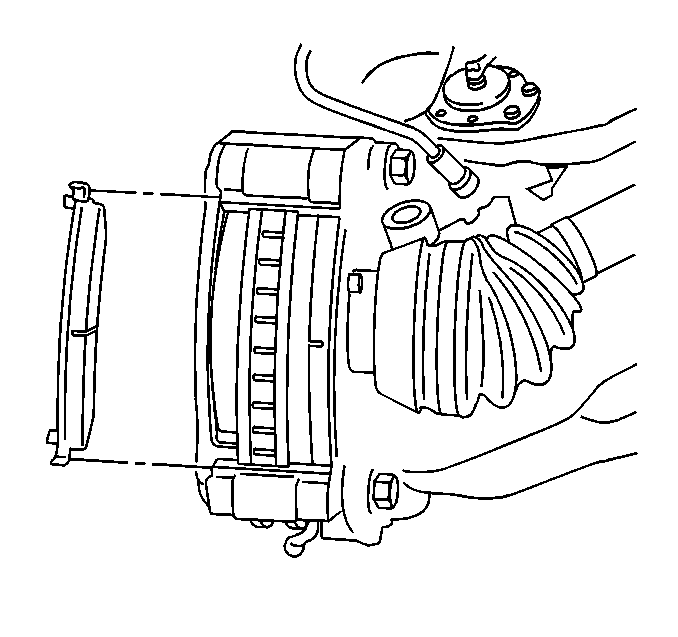
Important: Lift the inner edge of the caliper boots next to the pistons. Press out any trapped air. The boots must lay flat below the level of the piston faces.

Notice: Use the correct fastener in the correct location. Replacement fasteners must be the correct part number for that application. Fasteners requiring replacement or fasteners requiring the use of thread locking compound or sealant are identified in the service procedure. Do not use paints, lubricants, or corrosion inhibitors on fasteners or fastener joint surfaces unless specified. These coatings affect fastener torque and joint clamping force and may damage the fastener. Use the correct tightening sequence and specifications when installing fasteners in order to avoid damage to parts and systems.
Tighten
Tighten the caliper guide pin bolts to 115 N·m (85 lb ft).

Notice: Make sure the brake hose is not twisted or kinked after installation. Damage to the hose could result.
Important: Install NEW copper brake hose gaskets.
Tighten
Tighten the front brake hose bolt to 54 N·m (40 lb ft).
